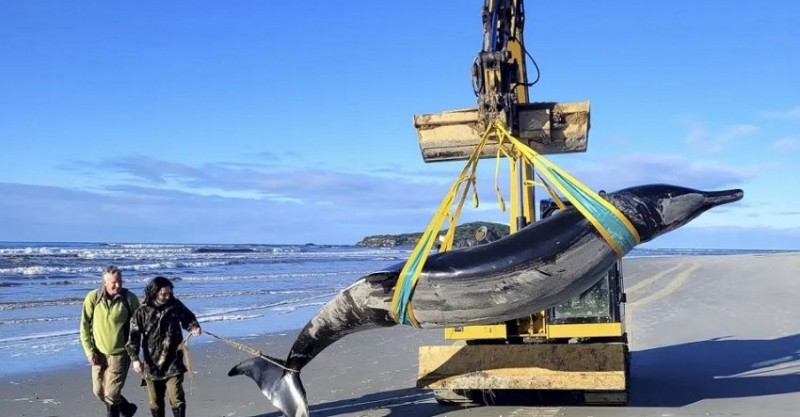
WELLINGTON, New Zealand: A groundbreaking find on a New Zealand beach could provide crucial insights into one of the world's rarest whales. Scientists believe that a spade-toothed whale, an elusive creature never before seen alive, has washed ashore.
On July 15, the New Zealand Department of Conservation reported the discovery of a five-meter-long whale on an Otago beach. Initial observations suggest that it might be a spade-toothed whale, recognized by its unique color patterns, skull shape, beak, and teeth.
Hannah Hendriks, a marine technical adviser for the department, remarked, "We know very little about these whales, so this discovery could be a major breakthrough, offering new scientific knowledge."
If confirmed as a spade-toothed whale, this specimen would be the first of its kind available for detailed study. Scientists hope to examine its anatomy, diet, and potentially uncover secrets about its mysterious habitat.
Previously, only six spade-toothed whales have been identified, with earlier findings on New Zealand's North Island. Unfortunately, those specimens were buried before DNA tests could confirm their species. This time, the whale has been placed in cold storage, and researchers will work with local Māori tribes to plan its examination.
Whales hold significant cultural value for New Zealand's Indigenous people, who view them as taonga, or sacred treasures. In April, Pacific Indigenous leaders signed a treaty acknowledging whales as "legal persons," though this status does not have legal force in participating countries.
The spade-toothed whale's habitat remains largely unknown. These deep-diving whales surface so infrequently that locating them has been challenging. The southern Pacific Ocean, with its deep ocean trenches, is believed to be their general habitat.
"It's like looking for a needle in a haystack," Hendriks explained. "Researching marine mammals is difficult when they rarely surface."
Genetic testing to confirm the whale's species may take several months. Previous attempts to identify this species have involved extensive research and collaboration between scientists and local communities.
Kirsten Young, a senior lecturer at the University of Exeter who has studied spade-toothed whales, expressed enthusiasm about the discovery. "It raises questions about how many of these whales are out there and how they live," she said.
The first spade-toothed whale bones were found in 1872 on New Zealand's Pitt Island, with further discoveries in the 1950s and 1986. DNA sequencing in 2002 confirmed that these bones belonged to a distinct species. In 2010, two more dead spade-toothed whales washed ashore, initially misidentified until tissue samples revealed their true identity.
According to the Department of Conservation, New Zealand is a hotspot for whale strandings, with over 5,000 recorded incidents since 1840.
Recent Updates:
Discover the Hidden Gems of Junagadh: Top 5 Places to Visit
Explore India's Lake Cities: Unwind by the Water's Edge
Essential Tips for a Successful Couple's Trip: Avoid These Common Mistakes